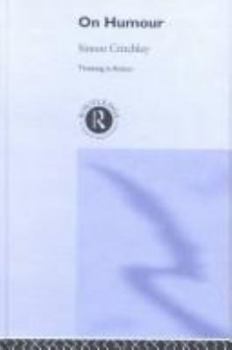On Humour
Select Format
Select Condition 
Book Overview
Does humour make us human, or do the cats and dogs laugh along with us? On Humour is a fascinating, beautifully written and funny book on what humour can tell us about being human. Simon Critchley skilfully probes some of the most perennial but least understood aspects of humour, such as our tendency to laugh at animals and our bodies, why we mock death with comedy and why we think it's funny when people act like machines. He also looks at the...
Format:Paperback
Language:English
ISBN:0415251214
ISBN13:9780415251211
Release Date:May 2002
Publisher:Routledge
Length:144 Pages
Weight:0.40 lbs.
Dimensions:0.4" x 5.1" x 7.8"
Customer Reviews
3 ratings
Funny how good it is.
Published by Thriftbooks.com User , 14 years ago
I didn't realize how much there is to say about humor until I read this book. This book has a complex and involved exploration of humor. This is a book worth having as a reference and is the type of book you quote and reread. I read it when as a comedian, I want to reconnect with the basic ideas behind why we need humor. An essential for people who take film, writing, or comedy....Seriously.
We came, we saw, we had a good laugh...
Published by Thriftbooks.com User , 16 years ago
Everyone is their own authority on humor. After all, who has the right to tell another person "Stop laughing! You don't find that funny!" Though humor contains distinct subjective elements, the story doesn't end there. Some jokes, characters, or narratives seem to elicit more laughter than others. In such cases, humor appears to contain objective traits. Here lies the comedian's Holy Grail. What makes people laugh and why? A comedic formula that guarantees mass expulsions of laughter remains as elusive as that legendary chalice. But people pursue it. Though dangers await all who search, as we will see, the rewards are so momentous they render all risks insignificant. Laughter, at heart, is a philosophical problem. If we knew for certain the source of mirth, and we might someday, we wouldn't need sitcoms, romantic comedies, or bawdy limericks to stimulate our pleasure centers. We do know that humans laugh, and laughter seems indubitably human. This small and entertaining book by philosopher Simon Critchley starts with that simple proposition. We laugh but why? Other animals, such as hawks or grouse, don't seem to. But "reducing" a human to an animal or vice versa seems to make us smirk, or at least feel disgust, depending on the analogy. Anthropomorphizing animals, on the other hand, really seems to get us going. The book cites numerous examples, including cartoons such as "The Far Side" (as well as a joke about a rather naughty talking bear). Lurking underneath such species bending is human behavior. It turns out, according to this book, that we're far funnier than any animal. At the core of humor we find ourselves. All of our glory and puffery can get reduced to ridiculousness by an ill-timed fart. Such events verify our corporeality. Humor, Critchley argues, contains a "metaphysical unease." Maybe all our self-adulation adds up to nothing but pretense? Existential discomfort can cause laughter, as though we know deep down that the joke is really on us. And, apart from its subjective and objective elements, humor also has cultural boundaries. It emphasizes and support a particular ethos. As such, most jokes don't work outside their culture of origin. Humor can simultaneously elevate a culture while denigrating those outside of that culture. "Ethnic humor," discussed a little too briefly in this book, seems to have this origin. All of this leads to Critchley's own two-point theory of humor. First, humor helps us acknowledge our world, or how things are for us within our culture. Second, humor hints at how we can improve that same world by using common sense to help us identify the ridiculous elements of our lives. Laughter can sprout change. The book's final chapter builds on this theory using Freudian terminology and seems somewhat anticlimactic and a little out of place. Suddenly, Freudian analysis invades the discussion with talk of ego, super-ego, and even "Super Ego II," a more mature Super-Ego. Though relevant, it doesn't add anything subs
Great reading
Published by Thriftbooks.com User , 20 years ago
Critchley observes humour from many perspectives: What is the role of crossing conventional cultural boundaries in comedy? How are the most simple-minded and -- may I say -- barbaric jests used as tools of societal isolation, racism and sexism? In what manner are religious ideas similar to or different from comical conceptions? Most importantly Critchley observes the relationship between our cultural existence and our profound and inescapable, but constantly disturbing animality. Critchley's writing is extremely enjoyable. His theorizing could be occasionally hard to grasp if not familiar with his philosophical background, but the book never turns dull. Actually, in addition to being able to keep up the reader's enthusiasm, Critchley's writing is also remarkably amusing. Not only being explained perceiving theory of comedy, the reader is also able to test the theory himself while reading by observing his own chuckles, bursts of laughter and dark grins as Critchley tells -- depending on the context -- more or less witty jests. And always the jokes help to illustrate his more academical ends. Personally I found the work fresh and inspiring, and also in aesthetic sense nimble. Enjoyable book, from cover to cover.






